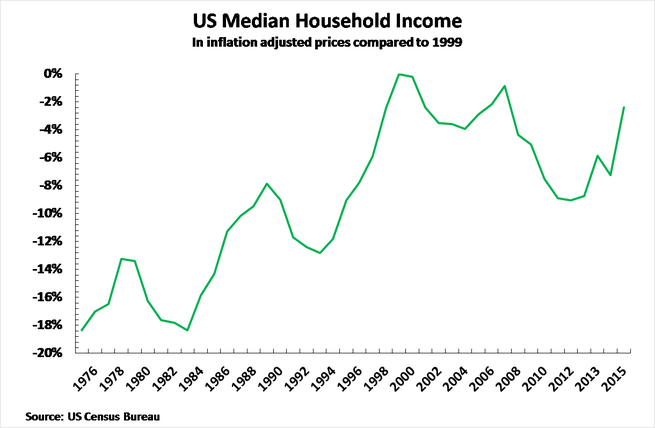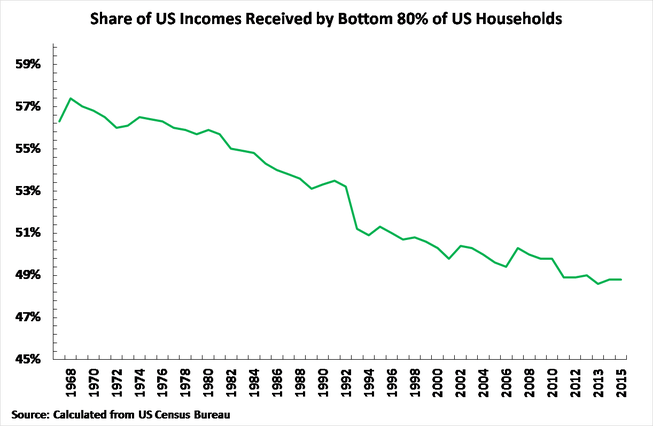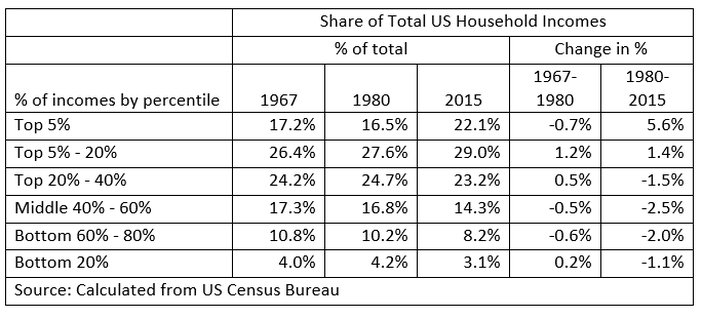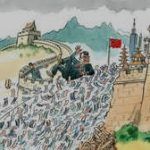Political destabilisation
Both the Anglo-Saxon countries, the US and UK, which adopted neo-liberal Reaganite/Thatcherite policies are experiencing deep political destabilisation.
Both the Anglo-Saxon countries, the US and UK, which adopted neo-liberal Reaganite/Thatcherite policies are experiencing deep political destabilisation.
- Trump’s nomination as Republication Presidential candidate was against the opposition of the overwhelming majority of the Republican Party establishment. Simultaneously in the Democratic Party primaries Bernie Sanders became the first candidate declaring themselves to be a socialist to receive mass support in the US for almost a century. The selection of Clinton as Democratic Party candidate for President was only achieved amid blatant manipulation by the Democratic Party leadership. Trump’s election as President was against the opposition of the overwhelming majority of the US mass media. Once elected President Trump’s administration was gripped by crisis since day one. His National Security Adviser, Michael Flynn, was forced to resign after only 24 days in office, Trump’s dismissal of the Director of the FBI Comey was widely condemned. Leaks against the President from inside US police and intelligence agencies, both the CIA and the FBI, were regular. Numerous Congressional investigations of possible corruption and/or collusion with the Russian government are proceeding. Major US mass media, for example the New York Times and CNN, are openly pursuing the impeachment of the President. These factors clearly signify the most intense crisis in US politics since World War II.
- In Britain, severe infighting in the ruling Conservative Party forced Prime Minister David Cameron to call a referendum on British membership of the European Union (EU). Despite support for EU membership by all major political parties the referendum took the economically irrational decision to leave the EU. Cameron resigned as Prime Minister the day after the referendum result. The exchange rate of the pound fell by 11% in only three days, creating an inflationary wave that is continuing to the present. Theresa May, who had supported remaining in the EU, then became Prime Minister declaring she would lead Brexit. However, when May then called a General Election in June 2017 to secure a firm majority for Brexit in Parliament the Conservative Party then lost its overall majority in Parliament. Over a year after the Referendum the UK government had no coherent position on Brexit and all major political commentators concluded Britain was in the deepest political crisis since World War II.
This article analyses the way in which US neo-liberalism, introduced by Reagan, led to the deep destabilisation of US politics.
US median incomes
There is no mystery as to the economic reasons for the deep political discontent shown during the US Presidential campaign. As Figure 1 shows US median household incomes by 2015 were still below the level of 16 years previously in 1999. At the trough of incomes in the Great Recession, in 2012, US median household incomes were more than 9% below their 1999 peak level. The US population had therefore suffered more than a decade and a half serious fall in incomes – which would produce deep political discontent and anger in any country.
US median incomes
There is no mystery as to the economic reasons for the deep political discontent shown during the US Presidential campaign. As Figure 1 shows US median household incomes by 2015 were still below the level of 16 years previously in 1999. At the trough of incomes in the Great Recession, in 2012, US median household incomes were more than 9% below their 1999 peak level. The US population had therefore suffered more than a decade and a half serious fall in incomes – which would produce deep political discontent and anger in any country.
Figure 1
Trends in US income inequality
The political consequences of this trend of falling US incomes was made worse by the great increase in US income inequality and the falling share of incomes received by the great majority of the US population.
Figure 2 shows that the share of total US incomes received by the bottom 80% of the US population, the overwhelming bulk of the US people, fell from 56% in 1967 to 49% in 2015. Over the same period the share of total incomes received by the top 20% of the population rose from 46% to 51%.
The net result was therefore that by 2015 the top 20% of the US population was receiving a higher share of US total incomes than the bottom 80%.
Figure 2
Trends before and after 1980
To analyse these processes in more detail Table 1 below shows the percentages of US total incomes received by different levels of US income groups. As it will be seen that a clear change took place in 1980 the changes are shown in two periods – 1967-1980 and 1980-2015.
Analysing first the richest and poorest groups, from 1967-1980 the share of total incomes received by the 20% of American households with the lowest incomes rose marginally from 4.0% to 4.2%. The percentage of total income received by the top 5% fell from 17.2% – 16.5%. A small but definite evening out of the most extreme US income differences was therefore occurring in 1967-1980.
After 1980 this trend radically reversed. The share of incomes of the bottom 20% of US households fell from 4.2% to 3.1%. Simultaneously the share of incomes of the top 5% of US households rose by an extremely sharp 5.6% – from 16.5% to 22.1%. Furthermore, the share of total incomes in every income group in the bottom 80% of the US population declined – the total fall for 80% of the population being an extremely severe 7.1%, from 55.9% to 48.8%.
In monetary terms, the total income of the top 20% of US households in 2015 was $5.1 trillion while that of the entire bottom 80% was only $4.9 trillion. The total income of the top 5% of the US population in 2015 of $2.2 trillion was over seven times that of the bottom 20% of the US population of $0.3 trillion.
In summary, if from 1967-80 there had been some evening out of the most extreme US income inequalities, after 1980 there was instead a massive increase in the share of incomes of the top 5% of the population with and a simultaneous severe loss of the share of incomes of 80% of the population.
Given these extreme increases in income inequality in the US after 1980 the severe increase in US political instability is entirely logical.
Table 1
Conclusions
What conclusions that follow from these trends for China?
The first is clearly that the bogus claim put forward by Chinese neo-liberals that increasing inequality is a product of state monopolies is false. The US does not possess state monopolies but over almost four decades the US has seen a dramatic increase in inequality. Sharply increasing inequality is clearly rooted in the US neo-liberalism system.
Second, that the two Anglo-Saxon countries, the US and UK, in which the neo-liberal policies of Reagan/Thatcher were adopted have both now both experienced deep political destabilisation with the Brexit vote and the turmoil of the US Presidential election.
In summary, analysis shows that Reagan style supply side policies deeply damaged the US economy. The economic processes producing this are analysed in detail in my book The Great Chess Game (一盘大棋?中国新命运解析). But the deep turmoil in both the US and UK also shows that Reagan style supply side policies also deeply destabilised US politics.
Both the economic and the social reasons for China’s correct decision to reject Reagan style supply side policies are therefore entirely clear.
* * *
This article analysing the lessons for China of political instability in the US was originally published in Chinese at Sina Finance Opinion Leaders on 27 October 2016 – that is immediately prior to the US Presidential election. The introductory section ‘Political Destabilisation’ has been updated to include events since the US election, the economic sections of the article are unaltered.
Related articles
The US presidential election and its effect on US relations with China
It is too early to tell the effect on the result of the US Presidential election of Trump ...
Read More Comparison of Hong Kong and ‘poor whites’ in the US South
July 1st 2017 was the 20th anniversary of the correction of one of the great crimes against China ...
Read More Why China’s social achievements are even greater than its economic ones
Attempts are sometimes made to claim that China’s gigantic economic growth, the greatest in a major economy in human ...
Read More Good China-Russia relations are the guarantee of world peace
President Xi Jinping’s visit to Moscow on the way to the G20 summit draws attention to a key ...
Read More China is right to maintain & tighten capital controls
During 2017 China has been tightening its capital controls to prevent any export of capital from the country ...
Read More 









